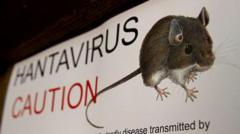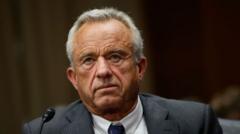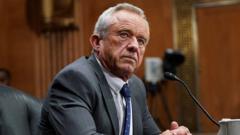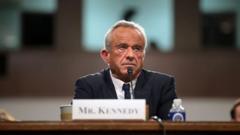Kennedy's decision to overhaul the Advisory Committee on Immunization Practices (ACIP) has raised alarm among public health experts, highlighting potential biases against vaccines while aimlessly questioning the safety of longstanding immunizations.
RFK Jr. Reshapes Vaccine Advisory Panel, Sparking Controversy

RFK Jr. Reshapes Vaccine Advisory Panel, Sparking Controversy
US Health Secretary Robert F. Kennedy Jr. appoints new advisors to review long-established children's vaccination schedules, igniting concerns over the panel's composition and qualifications.
In a significant shift, U.S. Health Secretary Robert F. Kennedy Jr. has appointed a new group of advisors for the Advisory Committee on Immunization Practices (ACIP), tasked with reviewing immunization schedules for children and teenagers. The panel convened for its first meeting on Wednesday, following Kennedy's controversial dismissal of all 17 previous members on June 9, a move that has ignited debate within the public health community.
The seven new appointees, which include several individuals known for their skepticism towards vaccinations, have prompted concerns regarding their qualifications to make decisions on vaccine recommendations. The ACIP plays a critical role in advising the U.S. Centers for Disease Control and Prevention (CDC) on vaccination protocols.
At the meeting’s outset, newly appointed chair Dr. Martin Kulldorff, previously a professor at Harvard University, revealed that he lost his job due to refusing the COVID-19 vaccine. He indicated that the panel would initiate working groups to scrutinize vaccination schedules, potentially reassessing the necessity of the hepatitis B vaccine for newborns—a vaccine that has been shown to prevent a disease that significantly contributes to liver cancer.
Experts have voiced strong reservations about the rationale behind re-evaluating vaccines that have been licensed for seven years or more. Bill Hanage, a professor of epidemiology at Harvard, articulated that questioning the approval processes for such vaccines lacks any rational basis. The panel’s intended discussion on respiratory virus RSV vaccinations has been postponed, causing further uncertainty.
Additionally, the panel's scheduled presentation on thimerosal, a preservative once common in vaccines but no longer used in most, has been critiqued as bewildering. Critics including Dr. Paul Offit, a former ACIP member, have pointed out that many of Kennedy’s selections share a historical bias against vaccinations, diverging from the traditionally balanced viewpoints represented within the committee.
An unexpected development occurred when one appointee, Dr. Michael Ross, withdrew from the panel just before undergoing a financial holdings review. This shift has compounded criticisms from across the political spectrum, notably from Republican Senator Bill Cassidy, who has expressed skepticism regarding the panel's composition and its ability to function meaningfully without a CDC director in place.
Kennedy's overhaul of the ACIP has rekindled debates over vaccine safety, efficacy, and the politicization of health policy, while also raising questions about the future direction of public health guidance in the United States.



















